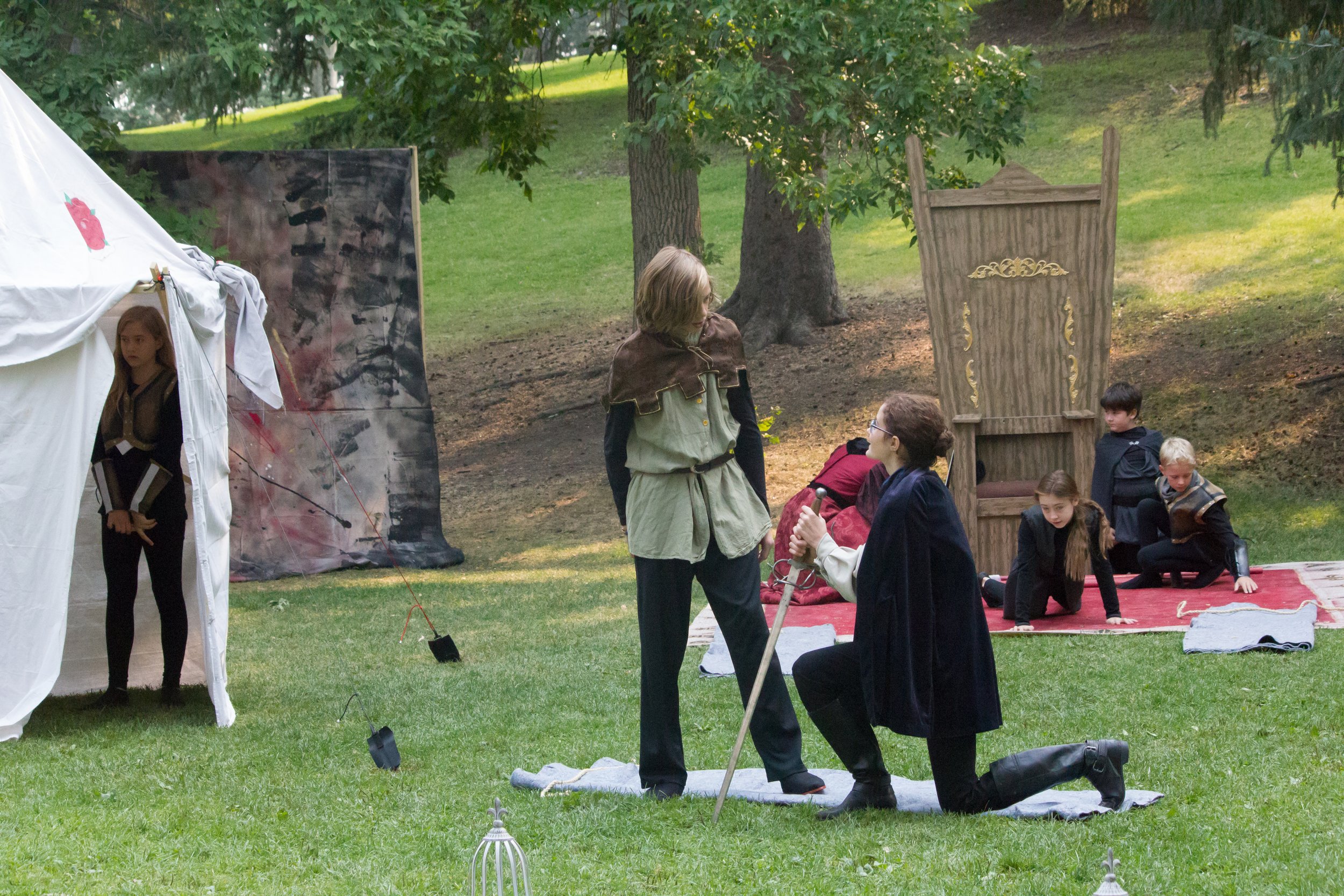The Children’s Shakespeare Society
Youth Protection Policy
Statement of Conduct
- The Children’s Shakespeare Society is committed to creating and maintaining the safest possible environment for all participants in TCSS activities.
- It is the duty of all TCSS members, spouses, partners, and other volunteers to safeguard to the best of their ability the welfare of, and prevent the physical, sexual or emotional abuse of children and young people with whom they come into contact.
- The same safeguards shall be extended to any other vulnerable persons such as the elderly and at risk (disabled) individuals.
Scope
- This statement of conduct applies directly to all TCSS members and independent contractors, associates and volunteers in our programs, activities, or events who come into solitary or unsupervised contact with youth or vulnerable persons, including families and TCSS youth mentors or assistants and young volunteers. This policy also applies to all adults over the age of 18 years who are mentoring or assisting in any program or event for TCSS.
Certification Requirements For All TCSS
All individuals must be certified by TCSS to conduct programs. To be certified the following steps must be taken:
- Adoption of Youth Protection Policy
- Development and implementation of training program for clubs and students
- Development of screening process for adults involved in program
- Establishment of process for investigation of allegations and record-keeping
TCSS
- Has adopted an zero-tolerance policy against abuse and harassment
- Does everything in its power to ensure that vulnerable persons are protected through effective assessment and education of volunteers
- Takes any allegations or reports of abuse or harassment seriously; facilitates timely reporting in compliance with state law
- Prevents contact with known persons who are prohibited by law from working with vulnerable persons
- NOTE: Please see the TCSS website for the complete Risk Management Policy.
“Abuse” means physical, emotional or sexual abuse;
- “Physical abuse” means the intentional use of force to the body which results in injury. It may be a single incident or series or pattern of incidents;
- “Emotional abuse” means chronic exposure to alcohol or drug abuse, verbal attacks on a person’s sense of self, repeated rejection or humiliation. It also means exposure to domestic abuse, isolation or existing in an environment of fear and/or anxiety; and
- “Sexual abuse” means improper and unwanted exposure to sexual contact, activity or behavior. This may be engaging in implicit or explicit sexual acts with a protected person, or forcing or encouraging a protected person to engage in implicit or explicit sexual acts alone or with another person of any age of the same sex or of the opposite sex. It includes, but is not limited to, any sexual touching, intercourse or exploitation, non-touching offenses, indecent exposure, or exposure to sexual or pornographic material.
“Harassment” means any conduct by an individual that is directed at, and offensive to, another person or persons and which the individual knew, or ought reasonably to have known, would cause offense or harm. It includes any objectionable act, comment or display that belittles, demeans or causes personal humiliation or embarrassment or any act of intimidation or threat.
Harassment may include, but is not limited to:
- Conduct that erodes the dignity of the victim, particularly based on the victim’s color, race, national origin, ethnic origin, age, sex, gender, physical characteristics, sexual orientation, or physical or mental disability;
- Unwelcome and demeaning remarks, jokes, and innuendos about race, sex, religion, age, national origin, marital status, color or disability;
- Use, display, or distribution of racist, pornographic, derogatory, or other offensive written material;
- Practical jokes based on race, sex, or other discriminatory grounds;
- Verbal abuse or threats;
- Inappropriate or offensive gestures;
- Voyeruism or inappropriate photography or recording; and
- Misuse of the internet or the telephone.
“Sexual Harassment” means any intentional or unintentional behavior of a sexual nature that would make a reasonable person feel offended, humiliated or intimidated.
Sexual harassment can take many different forms and may include physical contact, verbal comments, jokes, propositions, and the display of offensive material or other behavior that creates a sexually hostile environment.
Sexual harassment may include, but is not limited to:
- Uninvited or unwanted touching;
- Uninvited or unwanted kisses or embraces;
- Crude or sexist jokes or comments;
- Sex-based insults, taunts, teasing or name-calling;
- Making sexually suggestive or obscene comments or gestures;
- Staring or leering at a person or at parts of their body;
- Making promises or threats in return for sexual favors;
- Making requests for sex or sexual favors;
- Repeated invitations to go out after prior refusal;
- Unwelcome sexual flirtations, advances or propositions;
- Persistent or unwelcome questions or insinuations or comments about a person’s private or sex life;
- Offensive phone calls, letters or internet communication;
- Voyeurism or inappropriate use of photography or recording.
“Volunteer” means any adult over 18 years of age involved with TCSS programs involving protected persons who has direct, unsupervised interactions with those protected persons. This includes, but is not limited to, TCSS Members, their spouses and other family members.
“Protected person” means a youth or other vulnerable person, and
- “Youth” means any person less than 18 years of age involved in a TCSS program, activity or event and to whom TCSS may have a duty of care, and specifically includes children;
- Vulnerable person” means anyone who is elderly, physically or mentally disabled or infirm, or suffering from any sort of disability that might render him or her in need of protection or care, who is involved in a TCSS program, activity or event and to whom TCSS may have a duty of care.
“Prohibited person” means anyone who
- Has been convicted of an offense which resulted in harm to an individual, including assault, sexual assault, sexual interference with a minor or failure to provide the necessities of life;
- Has been convicted of any offense which, in the opinion of the President or Board of Directors suggests an unacceptable risk of harm to a person in the care of that individual;
- Is subject to a court order prohibiting that person from being in contact with any other individual.
Recognizing the Signs and Symptoms of Abuse and/or Harassment
- Signs and symptoms of abuse or harassment may include:
- Sudden changes in behavior
- Aggressive/risk taking behavior or antisocial behavior
- Drop off in school performance
- Extreme activity or suden withdrawal
- Displays of low self-esteem
- Expressing general feelings of shame
- Changes in eating habits
- Insomnia
- Irritability or angry outbursts
- Fear, particularly of certain individuals
- Reluctance to be left along, clinging
- Sudden avoidance of certain people, places or things (that might remind him or her of the incident)
- Difficulty concentrating
- Anxiety or depression
- Nightmares
- Headaches, gastrointestinal distress, or abdominal, back, or pelvic pain
- Involvement in drugs or alcohol
- Suicidal thoughts and/or the verbalization of those thoughts
Some final thoughts regarding working with youth
- DO NOT
- Engage in rough physical games including horseplay
- Use physical force in any way, especially as a form of punishment
- Touch a youth in any way that could be interpreted as intrusive or sexual
- Make sexually suggestive comments, even as a joke
- Spend excessive time alone with a student, this may lead to misunderstanding
TCSS Commitments
In accordance with its moral, ethical and legal obligations, TCSS has adopted a Risk Management Policy that:
- Will ensure to the best of our ability that protected persons involved in TCSS programs, activities, or events are protected from abuse, harassment, or sexual harassment;
- Will ensure that TCSS programs are provided in a safe and caring environment;
- Will prevent contact between protected persons and known individuals who are either prohibited by law from working with protected persons, or who are consider by TCSS to be inappropriate individuals to be working with protected persons;
- Will NOT knowingly permit a prohibited person to participate in any program related to protected persons;
- Will NOT permit any person to volunteer, mentor, or assist in any programs or events without first determining the suitability of the person through TCSS’s screening process;
- Will designate each year a Risk Management Officer whose duties will include maintaining and raising awareness of this Risk Management Policy and advising the Board and President with respect to matters of harassment or abuse;
- Will encourage and facilitate the timely reporting of incidents where protected persons are at risk of harm;
- Will ensure prompt notification of all allegations of abuse or harassment made by protected persons where allegations involve TCSS or persons involved in TCSS programs, activities, or events;
- Will report any allegations of abuse of protected persons in compliance with state legislation and as outlined in the Risk Management Guidelines available on the District Website.
TCSS Procedures
- TCSS will be incorporated under the laws of the State of Montana, USA
- TCSS and it’s Board will be covered for general liability insurance.
- A Risk Management Officer will be appointed yearly to oversee the workings of this policy.
- TCSS is committed to protecting the safety and well being of all protected persons and will not tolerate their abuse or harassment. All allegations of abuse or harassment will be taken seriously and will be handled in accordance with the Risk Management Plan.
- TCSS will provide abuse and harassment training to all participants who will come into direct, unsupervised contact with protected persons. It will also maintain records of participation in training to assure compliance that all required to be trained have participated.
- The responsibility for providing these training sessions will rest with the President of the program and the Risk Management Officer.
- The calendar for training, the frequency of such, the descriptions of who is to participate and the content of the Program is the responsibility of the Risk Management Officer.
- Who is to be trained will be determined by the Risk Management Officer working in conjunction with the Board and President.
Screening of Volunteers
In connection with TCSS all teachers, mentors, and volunteers who will be alone and/or unsupervised with protected persons, and instructors over 18 must provide TCSS with a completed Criminal Record Check for working with youth, which also includes Vulnerable Sector Screening. For background check procedures, contact the Risk Management Officer. Anyone failing to pass such a background check may challenge the result of that check but must do so himself/herself by direct contact with the screening company at his or her own expense.
Further Details on Volunteer Screening
All volunteers interested in participating in TCSS programs and events and who will be working alone and/or unsupervised with protected persons must:
- Complete a Youth Volunteer Affidavit which can be seen at the end of this document and authorize TCSS to conduct a criminal background check.
- Undergo personal interviews.
- Provide a list of references. (Optional for certain programs)
- Understand and comply with the guidelines for TCSS programs.
- Meet TCSS requirements for working with students. TCSS requires that any volunteer who has admitted to, been convicted of, or otherwise found to have engaged in sexual abuse or harassment be prohibited from working with TCSS. If an individual is accused of sexual abuse or harassment, and the investigation into the claim is inconclusive, then for the safety of the youth participants and the protection of the accused, additional safeguards must be put in place to assure the protection of any youth with home the individual may have future contact. A person later cleared of charges may apply to be reinstated ot participate. Reinstatement is not a right, and no guarantee is made that he or she will be reinstated to his or her former position.)
Background Checks
The background checks performed by the Risk Management Officer are Widescreen Criminal/Sexual Predator checks using a national company hired by TCSS to perform such checks.
The checks show results only if a person has a felony record. They are not credit checks, nor do they reveal misdemeanors.
They are done using the birthdate and social security number of the individual being checked. All information is kept in strict confidentiality by TCSS. The results are shared only with the person who requested the check, the President, or the person being checked.
Billing for the checks does not include the names of the individuals checked.
Procedures for Adult Receiving Allegation of Abuse or Harassment
Any adult to whom a complainant reports an incident of sexual abuse or harassment should comply with the following guidelines.
- Receive Report from Complainant
- Listen attentively and stay calm. Acknowledge that it takes a lot of courage to report abuse. It is appropriate to listen and be encouraging. Do not express shock, horror or disbelief.
- Assure privacy but not confidentiality. Explain that you will have to tell someone about the abuse/harassment to make it stop and to ensure that it does not happen to other protected persons.
- Get the facts, but don’t interrogate. Ask the complainant questions that establish what was done and who did it. Reassure the
- complainant that he or she did the right thing in telling you. Avoid asking ‘why’ questions. Remember your responsibility is to present the complainant’s store to the proper authorities.
- Be nonjudgmental and reassure the complainant. Do not be critical of anything that has happened or anyone who may be involved. It is especially important not to blame or criticize the complainant. Assure the complainant that the situation was not his or her fault and that he or she was brave and mature to come to you.
- Record. Keep a written record of the conversation with the complainant as soon after the report as you can, including the date and time of the conversation. Use the complainant’s words, and record only what has been told to you.
- Protect the Complainant Ensure the safety and well-being of the complainant. If you or the complainant have any concerns regarding his or her safety, immediately remove the complainant from the situation and from all contact with
- respondent. Reassure the complainant that this is for his or her own safety and is not a punishment.
- Report to President and Board of Directors. Immediately upon receiving the complaint, report the allegation to the President and Board responsible for the program, activity, or event in which the alleged incident or incidents occurred and to the Risk Management Officer. They will review the complaint in order to ascertain whether it needs to be referred to an appropriate law enforcement authority or whether it is a matter to be handled using internal policies and guidelines.
- Ensure Privacy is Respected. Avoid gossip and blame. Do not tell anyone about the allegation other than those whom these Guidelines require to be told. Except as required by the Guidelines, all information with respect to the allegation must be kept strictly private and confidential to protect the rights of both the complainant and the respondent.
What to do if someone tells you of Harassment and/or Abuse
- Listen attentively and let him/her know it was right to tell you
- Assure him/her that they are not to blame
- Remain calm and make sure he/she feels safe
- Encourage him/her to share with you what happened and who was involved
- Make detailed notes including date and time
- Don’t promise to keep secrets and explain the necessity of informing a Risk Management Officer
Direct Response to Such Allegations
TCSS response to such allegations is covered in our Risk Management Plan. However, a few points are worth mentioning here:
- TCSS should confirm that the complainant has been removed from the situation immediately and from all contact with the respondent.
- Ensure the complainant receives immediate support services.
- Ensure the President, and the Board as well as the Risk Management Officer are notified and are contacting the parents.
Understanding the Needs of the Complainant
There will need to be a cohesive and managed team approach to supporting the complainant after an allegation is reported. The complainant is likely to feel embarrassed, confused, and may become withdrawn.
It may be difficult for volunteers, other members of TCSS who become aware of the complaint to understand how the complainant is feeling, but it would be helpful for the complainant to know that TCSS remains a support for them. Instructors, volunteers, mentors and other members of TCSS may feel unclear regarding their boundaries. However they need to do whatever is necessary to reassure the complainant of their support at all times.
Appropriate Behavior for Others Aware of Allegation
When addressing an allegation of abuse or harassment, the most important concern is the safety of the complainant. Members who become aware of the allegation should not speculate, make editorial comments, or offer personal opinions that could potentially hinder any investigation. Members who become aware of the allegation should be cautioned about speculating or commenting on the matter during the investigation. Members would especially not speak to the media during the investigation.
Comments made about a complainant in support of a respondent or about a respondent in support of a complainant are inconsistent with TCSS ideals. Furthermore, adverse comments made against either a complainant or a respondent could lead to a defamation claim filed against TCSS by the person about whom those comments are made.
Sanctions
Pursuant to TCSS policy, membership by any instructor, mentor, volunteer or member who admits to, is convicted or, or is otherwise found to have engaged in sexual abuse or harassment will be terminated. TCSS may not hire or use volunteers or mentors who is known to have engaged in sexual abuse, illegally sexually oriented acts or harassment. Upon obtaining information that any such person has been assisting or instructing for TCSS, their place in the organization will be terminated.
Review/Caution
- Most important concern is the victim
- You should not speculate, make editorial comments to media or others or offer personal opinions. “No Comment” is appropriate.
- Members should be cautioned about commenting on the situation and possibilities of slander or libel claims.
- If TCSS, it’s President or Board are accused - remove from all possible contact with the victim and other youth and treat as other accused would be treated.
Crisis Management Team
Everyone should be aware that we have a Crisis Management Plan. It is to be found in our Risk Management Plan and covers what everyone should do in the event of a serious emergency involving injury or death to any youth involved in TCSS programs.
The plan covers in detail everything from emergency preparedness to the handling of funerals.
It also includes appropriate addresses and phone numbers.
If a Crisis Should Occur
Should an emergency situation arise involving a minor in a TCSS program, please remember that we do have a Crisis Intervention Plan in place. The Crisis Intervention Plan is part of the Risk Management Plan.
- Should such an emergency occur, as soon as it is possible, contact in this order of priority:
- The Risk Management Officer
- The President
- The Board Members
- Whoever is contacted will implement the Crisis Intervention Plan and will be responsible for communications with the media and for notifying parents.
TCSS Responsibilities
TCSS requires that our instructors and Board Members complete the certification process once every three years.
Certification Process
TCSS agrees to do the following to prove certification to work with youth and other protected people:
- TCSS will endorse the Risk Management Plan by a vote of its Board of Directors, or have adopted a similar written policy on the prevention of abuse and harassment that was subsequently accepted by the Risk Management Officer.
- TCSS will have a Risk Management Officer who will be responsible for implementing and enforcing the Risk Management Plan.
- TCSS will hold protection policy training courses whenever necessary. (That includes the ability to use this form and presentation as part of the training.)
- Whenever possible, a list of services in the area (rape and suicide crisis hotlines, alcohol and drug awareness programs for teens, law enforcement agencies, etc.) should be available for TCSS youth.
- Follow TCSS instructions regarding “Youth Volunteer Affidavits”.
- TCSS agrees to obtain felony/sexual predator background checks on any persons required by the Risk Management Plan to have such checks.
TCSS should also
Plan activities so as to minimize situations where abuse may occur.
Whenever possible, arrange events in such a way that young people have a chaperone of the same gender. Avoid situations where one child is supervised by one adult.
Do careful interviewing of all prospective volunteers. If there is uncertainty about an individual, don’t be afraid to ask for references.
Always Remember
- We are all legally and morally responsible for the well being of all children participating in any TCSS program anywhere.
- Any young person who is visiting a TCSS sponsored event should be able to seek help, if needed.
- It is therefore essential that we have at leasts one member who has taken part in this Risk Management Training and who has passed the necessary background checks require to work with youth at each event, class, or program.
- With all of us working together, we can keep our programs safe and ensure that all participants have a meaningful and happy experience.
Appendix A: Volunteer Affidavit
TCSS is committed to creating and maintaining the safest possible environment for all participants in our activities. It is the duty of all TCSS instructors, mentors, volunteers and their spouses and partners to safeguard to the best of their ability the welfare of young people, and to prevent the physical, sexual, or emotional abuse of young people, the elderly, and any other at risk individuals with whom they come into contact.
Your signature below signifies your commitment to adhere to our internet privacy & media safety rules in regard to our children. We do not allow the posting or sharing of any of our members’ images, sound recordings, or video recordings in any way shape or form.
PERSONAL INFORMATION
Name:________________________________________________
Address:______________________________________________
City:____________________________Zip:___________________
How long at this address:_______ (If less than five years please list prior residence(s) on the back of this sheet.)
ADDITIONAL INFORMATION
Home Phone:_____________________Email:_________________
Business Phone:___________________
Position Applied For:______________________________________
Have you held a TCSS position in the past? Yes_________ No_____
If yes, what position and when?_______________________________
EMPLOYMENT HISTORY (5 years please attach additional sheets if necessary)
Current Employer:_________________________________________
Address/City/State/Zip:_____________________________________
Telephone:_____________________ Position:__________________
How long with this company?_______ Supervisors Name:_________
VOLUNTEER HISTORY WITH YOUTH (5 years please attach additional sheets, if necessary)
Organization Name:________________________________________
Address/City/State/Zip:_____________________________________
Telephone:___________________ Position:____________________
Dates Held:___________________ Director’s Name:_____________
PERSONAL REFERENCES
Name:__________________________________________________
Address/City/State/Zip:_____________________________________
Telephone:______________________Relationship:______________
Name:__________________________________________________
Address/City/State/Zip:_____________________________________
Telephone:______________________Relationship:______________
Name:__________________________________________________
Address/City/State/Zip:_____________________________________
Telephone:______________________Relationship:______________
QUALIFICATIONS AND TRAINING (relevant for this position)
________________________________________________________________________________________________________________________________________________________________________
CRIMINAL HISTORY
- Have you ever been convicted of or plead guilty to any crime(s)? ___yes ___no
- Have you ever been subject to any court order involving any sexual, physical or verbal abuse including but not limited to any domestic violence or civil harassment injunction or protective order? ____yes ___no
If yes, describe in full. Also indicate date(s) of crime(s) and in which country and state each took place. (Attach a separate sheet if needed)
________________________________________________________________________________________________________________
For TCSS Use Only:
______________Reference checked by_______________________
Date/Signature
WAIVER/CONSENT/RELEASE
I certify that all of the statements in this affidavit, and in any attachments hereto, are true and correct to the best of my knowledge. I also certify that I have not withheld any information that would affect this affidavit unfavorably, if disclosed. I understand that any omission of facts or misrepresentation will result in my elimination from consideration for any volunteer position with TCSS. I further certify that I understand that TCSS’s intent is to deny a position to anyone convicted of a crime of violence or a crime against another person.
I hereby give my permission for TCSS to investigate, verify and obtain information given in this affidavit, including searches of law enforcement and published records (including driving records and criminal background checks), contact with former employers and reference interviews. I understand that this information will be used, in part, to determine my eligibility for a volunteer position within TCSS. I also understand that as long as I remain a volunteer here, the criminal history records check may be repeated an any time. I understand that I will have an opportunity to review the criminal history and that there is a procedure available for clarification, if I dispute the record as received.
I specifically acknowledge that the representatives of TCSS will inquire about, and I authorize them to verify, my prior employment, experience, personal references, background, including criminal background checks, which may contain arrest and conviction data. I recognize that such inquires are in the interest of all persons involved in programs involving vulnerable persons within TCSS, and I fully consent to such investigations.
IN CONSIDERATION of my acceptance and participation in a volunteer position within TCSS, I to the full extent permitted by law, hereby release and agree to save, hold harmless and indemnify, all members, officers, directors, committee members and employees of the participating TCCS organization and events, from any or all liability
Continued from Previous Page….
for any loss, property damage, personal injury or death, including any
such liability which may arise out of the negligence of any of the Indemnities, which may be suffered or claimed by me as a result of an investigation of my background in connection with this affidavit.
I further agree to conform to the rules, regulations, and policies of TCSS and its affiliates, and understand that my service can be modified or terminated, with or without notice or cause, at any time, at the option of either TCSS or its affiliates, or at my option. I understand and agree that TCSS or its affiliates may, in their sole discretion, decline to accept my application for volunteer services with or without cause.
I ACKNOWLEDGE THAT I HAVE READ AND UNDERSTAND THE ABOVE AFFIDAVIT, WAIVER, CONSENT AND RELEASE, AND THAT I SIGNG THIS FORM VOLUNTARILY.
__________________ _______________ ________
Signature of Applicant Please Print Name Date







































































































